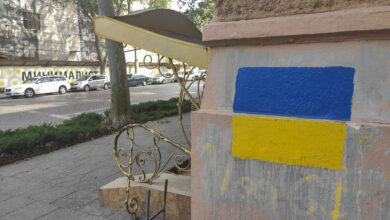Kyiv, neighboring municipalities inch towards war ‘normalcy’

By Lourdes Velasco
Hostomel, Ukraine, May 14 (EFE).- Kyiv and the towns of surrounding the Ukrainian capital that were occupied by the Russians are starting to recover from the invasion: electricity and water supplies have returned, the train service between Bucha and Kyiv is running again and buses are coming and going from the bombed Hostomel.
In Kyiv, which appeared to empty out in the first days of the war, the mayor Vitali Klitschko says the population is currently 2.5 million, nearing the just over 3 million people who lived in the city before the war.
Nikolai, 65, is happy to have returned to work. His colleagues call him “Didus”, “grandfather”. He is the driver of the bus that links Hostomel with Kyiv. “I didn’t know what to do at home anymore,” he says.
There are not as many passengers on his bus or cars on the road as before, but he thinks it is a good sign that the connection to the city has been restored. Neighbors can once again go to the doctor, to work and visit relatives.
Some people, like 79-year-old Natalia, take the bus just to go to the market. She stayed in Hostomel during the occupation with her husband and son.
“I listened every day and every night to the shelling,” she says. She never wanted to go down to the bomb shelter. Instead, she would hide under the blankets and wait for the noise to stop.
This is the first time Natalia has left her neighborhood since the Russians left. Along with eggs, bread and fish from the market, she bought cucumber and cabbage seeds to plant in her patch.
“I do have the energy to keep going, of course. I have nowhere else to go, this is my home and I continue my life here,” she says.
Olena sells tickets at the train station in Bucha, the municipality adjacent to Kviv where hundreds of suspected Russian war crimes are being investigated.
The train service closed on February 24, the day the war broke out, and reopened on May 8, although there used to be 35 trains per day in each direction. Now there are only two: one in the early morning, and one in the evening.
She left Bucha on the 24th itself, alarmed by the bombing in Hostomel. She returned to her village in the Zhytomyr region, and returned on May 5 when the company asked her to come back to work.
“I can’t get what happened in my village out of my mind,” Olena explains to Efe, relieved to have left. To this day she doesn’t understand nor is she able to process what happened, but she agrees that we have to move on.
“Nothing will ever be the same again. At the moment the train costs the same as before (15 grivnas) but they will raise it. I don’t think they will put back all the trains we had before,” she admits.
The roof of the Lavina shopping center in Kyiv, the largest in the country, was destroyed by a missile and reopened this week, and although workers are repairing the damage in this spacious and resplendent place, only a few customers have returned.
Marina has gone with her 6-year-old daughter Helena, because they had the day off and wanted to browse.
They are less afraid of the Russians returning, and are desperate for a bit of normality. Marina wants to buy Helena some clothes. She hopes that she will soon return to school, even if it’s just online classes.
Helena doesn’t let go of her mother’s hand. She wears a cap, ponytail, green glasses and a smiling face.
They were in the Kyiv region during the occupation, at Marina’s parents’ house in a quieter residential area. It’s been a week since they returned home and Marina has gone back to work. “I needed it, and not just for the money,” she says. EFE
lvp/ks





